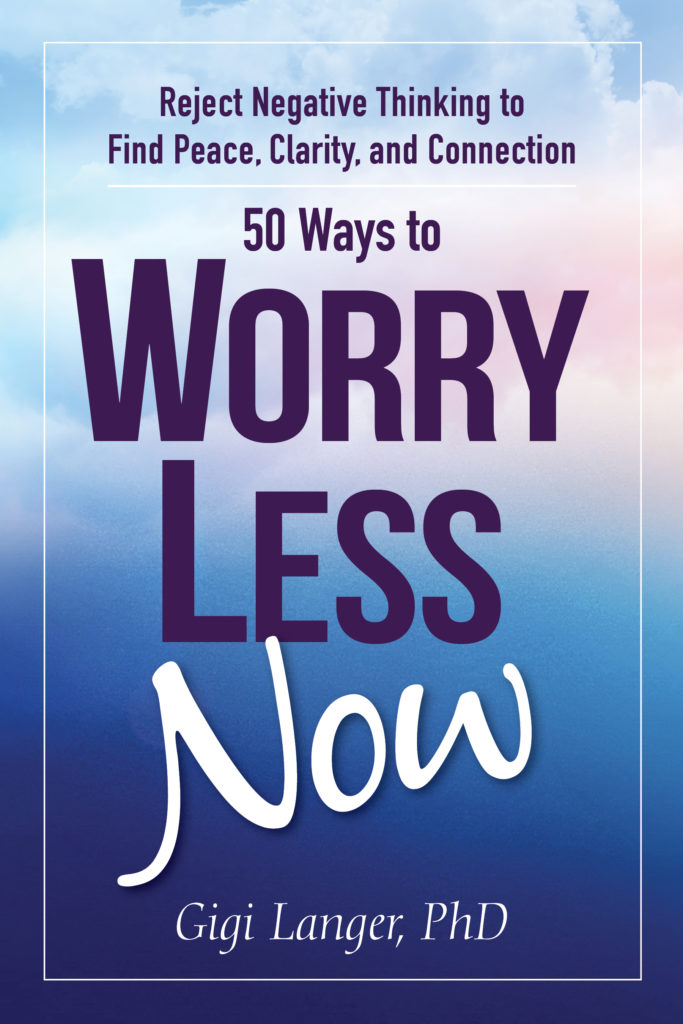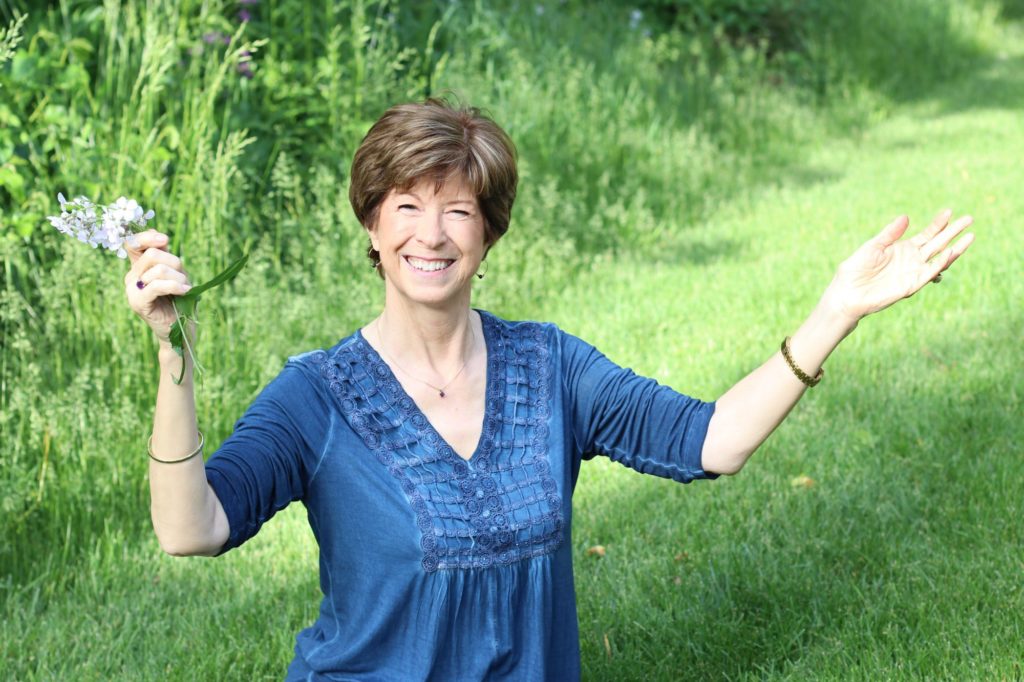This book is for the person facing hard times who wants practical and eclectic ways to improve their lives.
Gigi Langer, PhD – 5 March 2018
The Back Flap
Do you want to stop dreading the future or reliving past disappointments?
Thirty years ago, Gigi Langer was a prisoner of her worries who used alcohol, romance, and professional accomplishments to soothe her frayed nerves. After applying tools from therapy, recovery programs, scientific research, and a variety of philosophical and spiritual teachings, she stopped drinking and discovered how to overcome her own anxieties and stress.
Worry Less Now offers four life strategies and 50 eclectic tools to dissolve the “whispered lies” of negative self-talk. Although many books address negative thinking, very few give the reader step-by-step directions on how to defeat it. Others simply advocate a single approach.
With candor and humor, Langer describes a wide variety of strategies that helped her and others defeat dysfunctional relationships, perfectionism, addiction, and worry about loved ones. As an award-winning writer and professor, Langer skillfully shares compelling stories and exercises that empower you to:
-MANAGE life’s most difficult challenges with calm wisdom
-CREATE healthy relationships that blossom and thrive
-FULFILL your dreams through positive thinking
-SERVE others in their personal growth
Regardless of the situation, Worry Less Now will help you move through it with courage, hope, and insight.
About the book
What is the book about?
It’s about changing your life from one of limitation, fear, and negativity to one of peace, dream fulfillment, and connection. It outlines specific tools from a wide variety of sources that I and others have used to overcome past wounds, for example, chronic worry, perfectionism, dysfunctional relationships (yup, I’ve been divorced three times! I’m now happily married for 28 years); alcoholism/addiction, chronic pain, and worry about loved ones.
When did you start writing the book?
I got the idea about the four life strategies in 2011 because I wanted to share all the tools I’ve learned with those who haven’t had the opportunity to discover them.
How long did it take you to write it?
It took 3 1/2 years to write the first draft; then I sent it to beta readers and a developmental editor (Nina Amir) who suggested revisions. I took a year off to co-author an education book for Sage Publishing, and got back to “Worry Less Now” in 2015. I revised it two more times using feedback from two more groups of beta readers. I spent another six months getting it ready for print.
Where did you get the idea from?
The book began as a memoir chronicling my three short marriages, career as a professional horseback rider, and adventures hitchhiking across the north of Spain–all before I turned 38. My wise husband suggested that instead, I write a self-help book with “all those helpful things you say when you counsel people on the phone.”
Were there any parts of the book where you struggled?
Writing Chapter 5 where I discuss details about my dysfunctional family and sexual abuse was particularly hard.
What came easily?
In 2011 it was pretty easy to lay out the four life strategies of Honesty, Power, Choices, and Practices/Tools; and they’ve stayed the same ever since.
We all know how important it is for writers to read. Are there any particular authors that have influenced how you write and, if so, how have they influenced you?
Karen Casey: A prolific writer about recovery, codependence, and A Course in Miracles. Her writing is natural, inspiring, and clear. I can always hear Karen’s authentic voice in her words; so I tried to do the same.
Colin Tipping: The author of Radical Forgiveness uses stories exceptionally well to illustrate his principles in action. I wove into my book many authentic stories—a technique that didn’t come naturally to me (you should hear me try to tell a joke!). I admire how Colin generously gives away (for free!) many of his tools online; I do that too in my blog.
Brene Brown: The author of Gifts of Imperfection and Rising Greatly weaves her academic research into inspiring lessons on courage, vulnerability, and care. She inspired me to reference research in the same practical way.
Do you have a target reader?
People who feel defeated by life and want to change it for the better. This includes those who suffer from poor self-esteem, negative self-talk, depression, anxiety, addiction, illness, or abuse. This book is for the person facing hard times who wants practical and eclectic ways to improve their lives.
About Writing
Do you have a writing process? If so can you please describe it?
I usually write in the morning after an hour or so of quiet time with coffee, my kitty, and meditation. I write from around 10 a.m. to 2 p.m. When I’m blocked or discouraged, I use one or more of the 50 tools in the book to recharge my creative energy.
Do you outline? If so, do you do so extensively or just chapter headings and a couple of sentences?
I knew I’d have one chapter for each of the four life strategies, so I put up one big poster for each one. Then I used color-coded Post-Its to indicate which ideas, stories, and specific tools would go into each chapter. In chapters 5 and 6, I showed how I used all four strategies (and new tools not yet introduced) to overcome (a) my deep insecurities and claim my true self; and (b) codependence and worry about my husband when he relapsed.
Do you edit as you go or wait until you’ve finished?
I begin a section by free-writing; the next day, I polish/edit that section and compose the next chunk of text; the day after that, I edit all that I’ve written so far, and compose the next section. I did that with each chapter and then fit the parts together through transitions and stories. It took many drafts to get it where I wanted it.
Did you hire a professional editor?
Being a “clear writer” and having someone edit grammar alone is not enough. I strongly recommend a good editor. After writing my first draft, I sent it to Nina Amir (ninaamir.com) for developmental editing. I got some good advice which guided later revisions.
To edit the final draft, I picked Anita LeBlanc (thewriteword@sbcglobal.net), a former journalist who deeply understood the content. She streamlined the sentences, making them easy to read without losing my unique voice. She also discovered a few confusing parts that needed rewriting. We went through each chapter twice, using “Track Changes”—I made all final decisions. Yes, it was expensive—but totally worth it.
Do you listen to music while you write? If yes, what gets the fingers tapping?
Nope
About Publishing
Did you submit your work to Agents?
No
What made you decide to go Indie, whether self-publishing or with an indie publisher? Was it a particular event or a gradual process?
I didn’t want to wait a couple of years to go through the traditional process, so I studied self-publishing blogs to understand the plusses and pitfalls. I’ve written other books for big education publishers, so I was familiar with some parts of the process. My gut was pretty clear: I wanted to retain my own copyright and have control over the project.
Did you get your book cover professionally done or did you do it yourself?
Yes, Kelly Zorn (kellyzorn@me.com) did a fabulous job! She’s a true artist and so easy to work with. For interior design, I needed a typographer to set the tables, numbered exercises, and other illustrations. Tom Halley (th.t@mindspring.com) spent many hours making the manuscript beautiful and easy to follow. Again: expensive and totally worth it.
Do you have a marketing plan for the book or are you just winging it?
This was where I had the least experience, so I studied up to learn all I could. I hired Maria McGowan at SociableMedia.com to refine my website and other social media sites. The experienced publicist, Mary Bisbee-Beek and journalist, Natalie Tomlin (ntomlin48@gmail.com) advised me on media submissions. I’m also doing guest blogs, writing articles, and making presentations.
Any advice that you would like to give to other newbies considering becoming Indie authors?
When choosing a company to publish your book, beware of package deals that get your book printed but pay little attention to the quality of the writing or marketing. These companies make their money before selling any books, and may have little investment in the quality required for it to succeed in the marketplace.
About You
Where did you grow up?
Oakbrook, IL just west of Chicago, near Hinsdale. (My Dad was the first mayor of Oakbrook!)
Where do you live now?
Canton MI and Naples FL
What would you like readers to know about you?
My Bio: Gigi holds a PhD in Psychological Studies in Education and an MA in Psychology, both from Stanford University. As a professor, she won several awards for her teaching, and (as Georgea M. Langer) wrote four books for educators as well as hundreds of articles on professional growth.
As a person in recovery, Gigi hasn’t had a drug or drink for over 30 years, although she does occasionally overindulge in Ghirardelli chocolate and historical novels. Through speeches, retreats, and workshops, she helps thousands of people improve their lives at home and at work.
What are you working on now?
I’m doing what I can to get this book into the hearts and hands of those it will help. I’m writing blog entries, posting on social media, and offering workshops, book signings, retreats, and speaking events. Whew! It’s quite an effort!
End of Interview:
For more from Gigi visit her website, like her Facebook page, and follow her on Twitter.
Get your copy of 50 Ways to Worry Less Now from Amazon US or Amazon UK.



